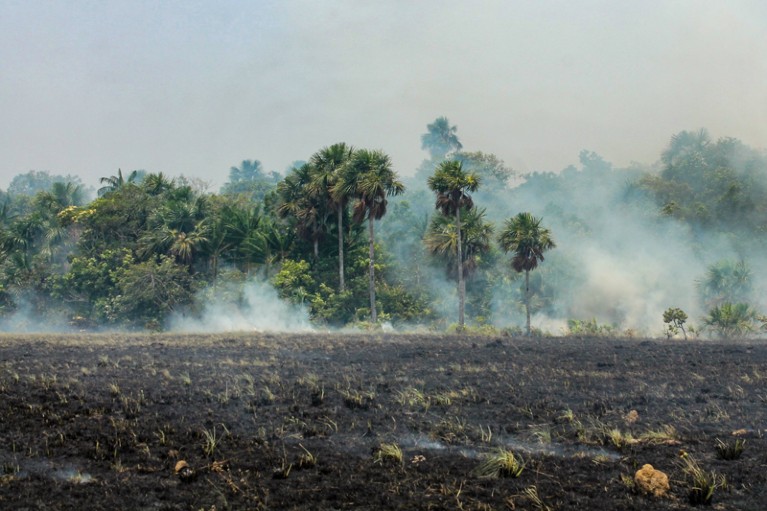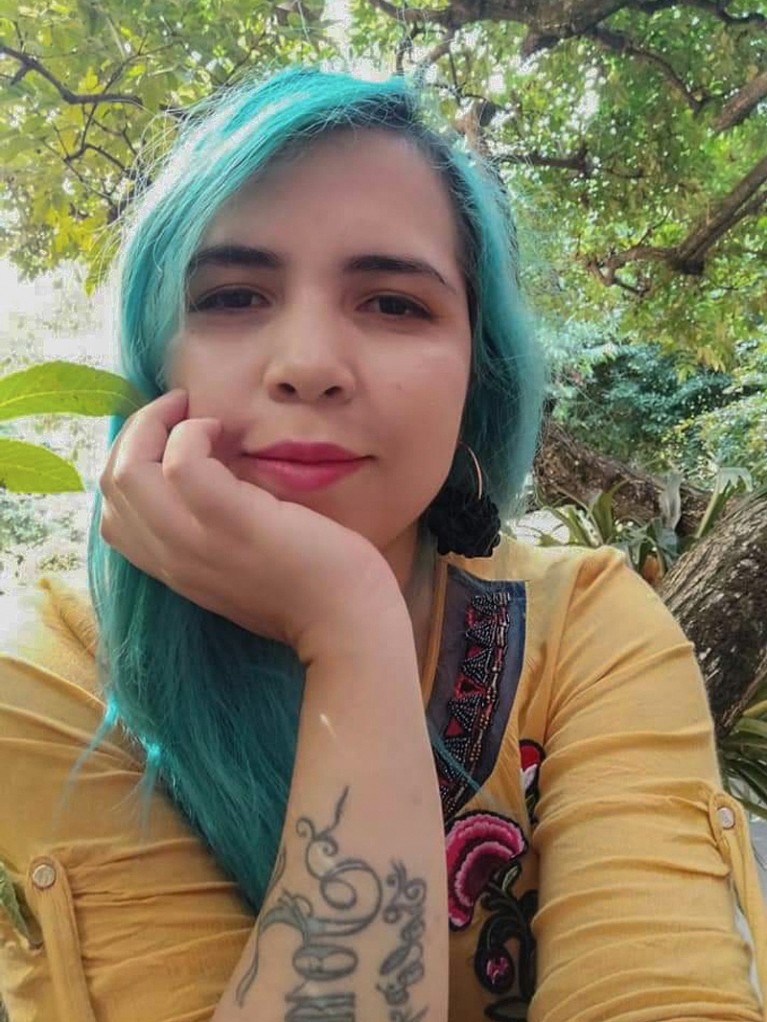
Wildfires are becoming more frequent in the Orinoquía region of Colombia.Credit: María Meza
María Constanza Meza Elizalde is a forest engineer and PhD student at the National University of Colombia in Bogotá, where she researches fire ecology and conducts fieldwork in hard-to-reach areas with recurring fire problems. With her adviser and other students in her research group, she’s been drafting and lobbying for legislation that aims to reduce fire risk overall, while recognizing diverse business and cultural practices related to fire.
Why is there a need for a science-backed fire-management bill?
I study the Orinoquía region, near the border with Venezuela. It’s an area of extensive savannahs, where the number of wildfires is increasing, mainly because of activities such as hunting, along with agricultural burning that gets out of control. Landscape-management decisions, very frequent burning or total fire suppression in the savannah are also factors. And climate change is affecting the wildfire dynamics.
As a result, we are seeing changing patterns, with more frequent and intense wildfires in forest areas where they were not common before, and covering larger areas. This leads to forest degradation and to political decisions in which only the negative side of fire is seen.
Communities living in fire-dependent ecosystems know how to reduce risks, but environmental authorities don’t recognize these practices. Right now, there are no laws or conservation strategies in Colombia that recognize the ecological role of fire.
How did you get involved in drafting fire legislation?
Because there were no public forums to talk about fires and develop strategies for reducing the risks, we began a dialogue with local communities about the problems and benefits of fires, while also involving non-governmental organizations, public entities, fire departments and national parks.
The great challenge is to articulate scientific, local and institutional knowledge to guarantee a fire-management plan that will result in safe and resilient landscapes.People think that only legislators can make laws. This is not true — citizens can propose them. We had the support of Congressman Mauricio Toro, who is a member of Colombia’s Green Alliance party, and his technical legislative staff. We designed a bill that recognizes both scientific and ancestral, traditional knowledge, while respecting ecological heritage and regulations for integrated fire management. The bill would also promote research to develop strategies for reducing the risk of wildfires, and encouraging ecological restoration, environmental rehabilitation and recovery of natural ecosystems affected by forest fires.

Forest engineer María Constanza Meza Elizalde has helped to draft legislation to reduce wildfires.Credit: Arturo Cortés
How do you balance this advocacy work with your PhD commitments?
It is difficult. Fortunately, my network of academic and family support allows me to raise my voice. Dolors Armenteras, my PhD supervisor, listened to my suggestion and taught me and the rest of the group to organize ourselves and work collaboratively.
When it comes to research, all the students in the group have our own theses, but we are a team, whose research and joint work contribute to our influence in decision-making. Alone, we couldn’t have had much impact.
Have you encountered people who don’t take you or your science seriously?
At the regional and local levels, the reaction has been mostly positive. And although not all national-level institutions take us seriously, we’ve found that legislators, regardless of their political position, take our science-based recommendations seriously. For me, as a PhD student, it has been very gratifying to have support from members of all political parties.
As a woman, I have other challenges to being heard. Being a woman in discussion spaces where the majority of participants are men, it takes more time to build your confidence. For example, I am an early-career researcher but I am also an engineer and I have a master’s degree. Yet, in some workspaces, people keep calling me a ‘girl’.
What’s your advice for early-career scientists who want to influence policy?
First, I want to express my admiration for scientists who work in remote areas affected by armed conflict. I know how difficult and even dangerous it is for environmental defenders to discuss controversial ideas to influence policies.
The greatest lesson I’ve learnt about the legislative process is how to communicate science more effectively and contribute to politicians’ capacity for understanding complex scientific problems.
As scientists, we do not always consider other stakeholders’ access to information, but it’s important that research results reach interested parties outside academia in a timely manner.
A communication strategy that considers economic disparities or technological barriers is essential. For example, written pamphlets are useless in communities with high illiteracy. So our group has been incorporating different communication strategies, including an art exhibition and a radio soap opera, to make the messages more effective.
This feels important, because in Colombia, we have many problems of climate change and armed conflict. We’re facing huge challenges but they are not insurmountable. If scientists work together, we can influence the attitudes and actions of communities and governments. The only way forward is collaborative work.

 How junior scientists can land a seat at the leadership table
How junior scientists can land a seat at the leadership table
 An IPCC reviewer shares his thoughts on the climate debate
An IPCC reviewer shares his thoughts on the climate debate
 Tapping local knowledge to save a Papua New Guinea forest
Tapping local knowledge to save a Papua New Guinea forest




